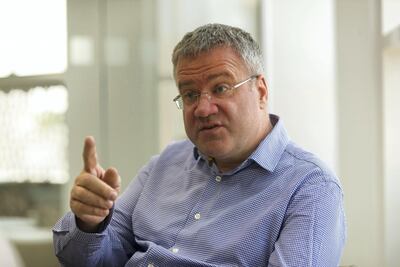Expensive branded medicines prescribed by doctors are driving up the cost of healthcare for insurers and employers, experts have said.
Insurers said too many physicians are sending patients home with bags of unnecessary drugs.
The issue is a factor in a new ranking that places the United States and UAE as among the most expensive places to buy drugs.
The US, Germany and UAE were ranked top three in a study of 50 countries by the British medical firm Medbelle that measured the difference in the cost of 13 essential medicines.
Last year, Abu Dhabi begin dispensing "generic" prescription medicines to provide better value for money and medics and insurers told The National the policy should be pursued more widely.
"Some good work is being done, but there is room for improvement to make huge savings by moving more of the market towards generic alternatives,” said Stephen MacLaren, director of health at Middle East insurance brokers AES International.
"Doctors need to reduce the number of unnecessary prescriptions they are currently issuing."
Dubai and Abu Dhabi have mandatory private medical insurance for all residents. That means prescription medicine is often fully covered, with some basic packages requiring patients pay about 20 per cent.
But high costs borne by insurance firms raise premiums and mean companies are charged more per employee.
Stringent licensing and repeated testing for the benefit of patients was another factor in driving up costs in the top ranked countries.
The cost of transporting batches to the Emirates from far-away production facilities also contributes to higher costs than many countries, experts said.
The findings released by Medbelle on Thursday showed extreme price variations worldwide for drugs to treat heart disease, blood pressure, diabetes, asthma, anxiety disorders and erectile dysfunction.
While the study's authors did not single out a specific reason for the disparity, they said it should spark a discussion on the inequality in pricing.
Doctors in the UAE said patients with the most basic medical cover may be the ones losing out.
“Patients are covered by insurance but for medicines for heart failure, severe critical coronary diseases or hypertension, the high price could limit access of a patient,” said Dr Walid Shaker, consultant cardiothoracic surgeon at Burjeel Hospital Abu Dhabi.

“Even though 80 per cent of the medication cost is covered by insurance, still some patients in our community cannot afford to pay the 20 per cent in case of high-priced medicines.”
Residents who sponsor family members and pay for the cheapest packages with low premiums are also affected.
“They may delay treatment or sometimes they may not come in to the medical facility at all because of the payment they need to make,” said Dr Thomson Antony, internal medicine specialist at Aster Clinic in Dubai.
Strict licensing regulation was another reason cited for higher prices.
“The regulatory licencing in countries like UAE are very stringent in order to maintain quality,” he said.
“Some groups of medicines require to be licensed and go for testing periodically so the cost can go up.”
The global study factored in the average price of well-known pharmaceutical brands and generic versions regardless of whether the medicines were covered by the country’s healthcare system or paid by the patient.
But insurers said doctors prescribing generic alternatives would reduce healthcare costs in the UAE.
The Department of Health in Abu Dhabi last year told healthcare facilities to dispense generic versions instead of well-known brands aiming to ease the burden on residents.
The government said it was keen “to provide patients with better value for money.”
The Ministry of Health has over the years slashed the prices of medicines to make healthcare affordable to all.
Medbelle said by uncovering the glaring price imbalance it hoped to address a global issue of barriers in access to healthcare.
“With this study, we hope to provide patients with a similar standard of transparency when it comes to medicine prices around the world," said Daniel Kolb, managing director at Medbelle.
“It is our hope that this index can be used to further the discussion around the immense inequality between countries when it comes to the accessibility and cost-effectiveness of healthcare.”

